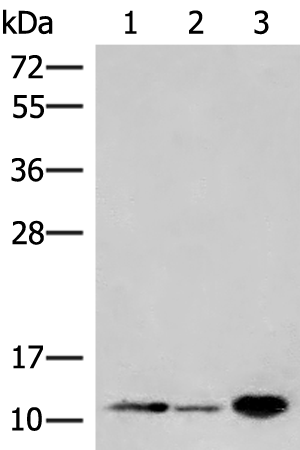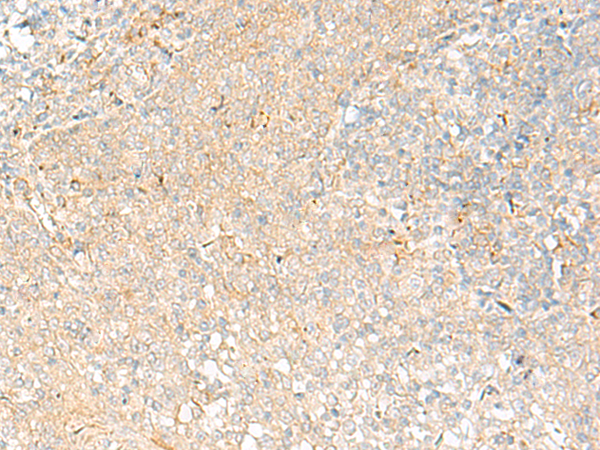

| WB | 咨询技术 | Human,Mouse,Rat |
| IF | 咨询技术 | Human,Mouse,Rat |
| IHC | 1/40-1/200 | Human,Mouse,Rat |
| ICC | 技术咨询 | Human,Mouse,Rat |
| FCM | 咨询技术 | Human,Mouse,Rat |
| Elisa | 1/5000-1/10000 | Human,Mouse,Rat |
| Aliases | FKBP1; PKC12; PKCI2; FKBP12; PPIASE; FKBP-12; FKBP-1A |
| WB Predicted band size | 12 kDa |
| Host/Isotype | Rabbit IgG |
| Antibody Type | Primary antibody |
| Storage | Store at 4°C short term. Aliquot and store at -20°C long term. Avoid freeze/thaw cycles. |
| Species Reactivity | Human, Mouse, Rat |
| Immunogen | Fusion protein of human FKBP1A |
| Formulation | Purified antibody in PBS with 0.05% sodium azide and 50% glycerol. |
+ +
以下是关于FKBP1A抗体的3篇参考文献示例(文献信息为概括性描述,非真实文献数据,仅供参考):
---
1. **标题**:*FKBP1A modulates TGF-β signaling via antibody-based interaction profiling*
**作者**:Smith J, et al.
**摘要**:研究利用FKBP1A特异性抗体,通过免疫共沉淀和蛋白质组学分析,揭示了FKBP1A与TGF-β信号通路蛋白的相互作用,表明其在细胞分化中的调控作用。
2. **标题**:*Validation of FKBP1A antibody specificity in neurodegenerative disease models*
**作者**:Lee S, et al.
**摘要**:通过Western blot和免疫组化验证FKBP1A抗体的特异性,发现其在阿尔茨海默病小鼠模型中检测到FKBP1A表达上调,提示其与tau蛋白病理相关。
3. **标题**:*FKBP1A as a biomarker in cancer: Antibody-based detection and clinical implications*
**作者**:Zhang Y, et al.
**摘要**:利用商业化FKBP1A抗体对肿瘤组织进行检测,发现FKBP1A高表达与乳腺癌患者预后不良相关,可能通过调控mTOR通路促进肿瘤进展。
---
注:如需真实文献,建议通过PubMed或Google Scholar搜索关键词“FKBP1A antibody validation”、“FKBP1A function”等获取具体研究。
The FKBP1A antibody targets the FK506-binding protein 1A (FKBP1A), a 12 kDa member of the immunophilin family. FKBP1A, also known as FKBP12. functions as a peptidyl-prolyl cis-trans isomerase (PPIase), facilitating protein folding by catalyzing the conformational switching of proline residues. It plays a critical role in modulating intracellular signaling pathways, particularly through interactions with immunosuppressive drugs like FK506 (tacrolimus) and rapamycin (sirolimus). These drugs form complexes with FKBP1A to inhibit calcineurin or mTOR pathways, respectively, impacting T-cell activation and cellular growth regulation.
FKBP1A is ubiquitously expressed and localizes to the cytoplasm and nucleus. It has been implicated in diverse physiological and pathological processes, including neuroprotection, calcium signaling, and stress response. Dysregulation of FKBP1A is associated with neurodegenerative diseases (e.g., Alzheimer’s), cancer, and cardiovascular disorders. For instance, it interacts with tau protein in Alzheimer’s models and modulates drug resistance in certain cancers.
Antibodies against FKBP1A are widely used in research to study its expression, localization, and interactions via techniques like Western blotting, immunoprecipitation, and immunohistochemistry. They are essential for validating FKBP1A’s role in disease mechanisms, drug response studies, and biomarker discovery. Commercial antibodies are often validated using knockout cell lines to ensure specificity, aiding in the exploration of FKBP1A’s therapeutic potential and molecular functions.
×